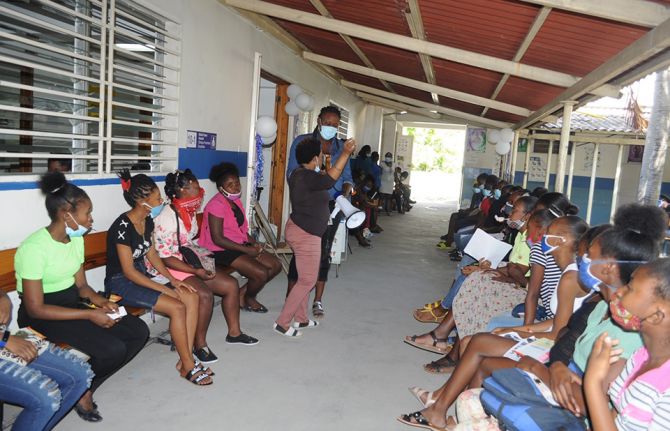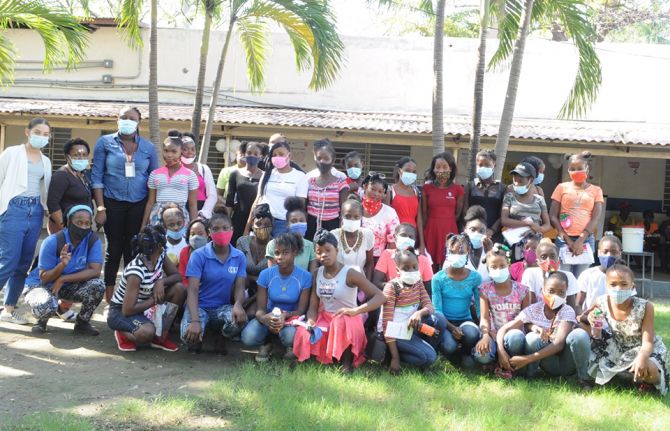


Feature Story
Community health workers strengthen HIV and COVID-19 responses
02 December 2021
02 December 2021 02 December 2021In 2001, Micheline Léon felt unwell. The then 33-year-old mother of three journeyed from her home in the small town of Corporand in central Haiti to a clinic in Cange. There she was diagnosed with HIV and tuberculosis.
Fortunately, three years earlier an organization called Zanmi Lasante—Haitian Creole for Partners in Health—had launched the HIV Equity Initiative. (Zanmi Lasante is the sister organization of the United States-based nonprofit health-care group Partners in Health.) This was one of the first projects in the world to effectively deliver antiretroviral therapy in poor, rural settings.
Twenty years later, Ms Léon is one of 2000 community health workers called accompagnateurs in the Zanmi Lasante network. Multiskilled teams of accompagnateurs are the link between patients and health facilities. They are also part of all HIV Equity Initiative discussions regarding patient care, treatment and social support.
Community health workers live in the areas where they work. They help to ensure that patients recover and stay healthy. Their main roles include medicine distribution and home visits, as well as linking people to care. They accompany patients to clinics and track those who have missed appointments. During the COVID-19 pandemic, the accompagnateurs were key to Zanmi Lasante’s care and treatment work. The home-based care and contact tracing skills refined in response to HIV are now being used for COVID-19.
Zanmi Lasante has a holistic approach to care that includes social services such as providing accommodation, food and transport. Community health workers help to coordinate all the support needed. They also serve the wider community by running educational campaigns on topics such as mental health and sexually transmitted infections.
Critically, the accompagnateurs empower and inspire people to take charge of their own health. Ms Léon is a role model within reach. Since starting treatment she has stayed adherent to it and her HIV viral load has remained undetectable since she began receiving viral load tests in 2017. She owns a small fruit and poultry business and sometimes spends time in Port au Prince, where she has a new grandson. She takes part in various group activities at the Zanmi Lasante site in Cange, including support groups, viral load classes and mothers’ clubs.
“The psychosocial support I received from Zanmi Lasante made me realize that my diagnosis was not a death sentence and I could go on and live a healthy and fulfilled life,” Ms Léon said.
Another stalwart Haitian HIV programme employs a community health approach. GHESKIO, the Haitian Study Group on Kaposi’s Sarcoma and Opportunistic Infections, was founded in 1982, the year before HIV was formally discovered. It is the world’s oldest HIV organization and has conducted research and provided clinical care over the past four decades.
GHESKIO has leveraged a community-based model to help Haiti respond to HIV and other public health crises. When the COVID-19 pandemic reached the country in March 2020, GHESKIO reinforced an existing programme—Distribution of ART in the Community—to ensure that clients living with HIV were provided with a three-month supply of medication. From a small room at the National Solidarity Association (ASON), a team packages medicines into plastic bags and pours over their client list. If a person is unable to come for their medicines, they’ll receive a home delivery.
GHESKIO also strengthened training activities for their multiskilled community health workers. In this way they provided social support for patients as well as home care for cases that did not require hospitalization.
“Our Community Unit played an essential role in the acceptance of new COVID-19 treatment centres in the impoverished, crowded slums,” said GHESKIO’s Program Coordinator, Patrice Joseph. “In collaboration with the Ministry of Health, we have strengthened contact tracing, case investigation and outbreak management for COVID-19.”
One of the newest community health workers is CV, a 35-year-old mother of three from Village de Dieu, a slum south of Port au Prince. She herself survived COVID-19. When she began feeling ill a community health worker accompanied her to get tested. Following five days at GHESKIO’s COVID-19 hospital, a community team conducted home visits to ensure her full recovery.
Now she works as a greeter at GHESKIO. She is also a GHESKIO community health agent, encouraging patients to come to scheduled visits. CV supports community sensitization around COVID-19 prevention by promoting sanitation and educating people about the importance of COVID-19 vaccination.
“I don’t take one day for granted,” she said.



